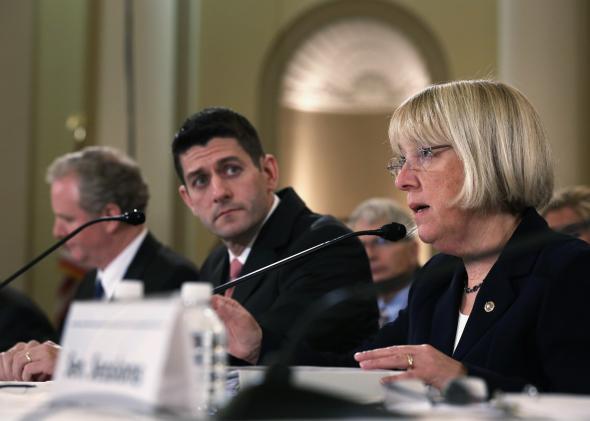Democrats and Republicans have a very serious, largely unbridgeable gap in their ideas about what to do about long-term fiscal policy in the United States. At the same time, interest rates are currently low, and the budget deficit is falling fast and is projected to stay low in the medium-term. Under the circumstances it is very logical that Patty Murray, Paul Ryan, and other members of Congress are trying to hash out a budget deal that doesn’t deal with the intractable budget conflict and instead focuses on reaching a narrower consensus about undoing some of the harm of sequestration and reducing the chance of a harmful government shutdown.
Except Lori Montgomery, who covers budget issues for the Washington Post, is covering this news like someone strangled her kitten:
The deal expected to be sealed this week on Capitol Hill would not significantly reduce the debt, now $17.3 trillion and rising. It would not close corporate tax loopholes or reform expensive health-care and retirement programs. It would not even fully replace sharp spending cuts known as the sequester, the negotiators’ primary target.
After more than two years of constant crisis, the emerging agreement amounts to little more than a cease-fire. Republicans and Democrats are abandoning their debt-reduction goals, laying down arms and, for the moment, trying to avoid another economy-damaging standoff.
The campaign to control the debt is ending “with a whimper, not a bang,” said Robert Bixby, executive director of the bipartisan Concord Coalition, which advocates debt reduction. “That this can be declared a victory is an indicator of how low the process has sunk. They haven’t really done anything except avoid another crisis.”
This reflects what has got to be the single strangest convention in political news today. Journalists who would never think of openly cheerleading for more people to get government-subsidized health insurance or for oil companies to secure a freer hand in drilling regard the goodness of deficit reduction as a kind of nonideological given. But it’s not! The whole reason it’s so hard for Congress to agree on a long-term fiscal deal is that everyone can agree that a long-term fiscal deal would be great if executed on their terms but not otherwise.
By contrast, there actually is reasonably broad agreement that another government shutdown would be bad for America. Having negotiators focus on an area where they might plausibly reach agreement is great news not a sign of the process sinking low.
